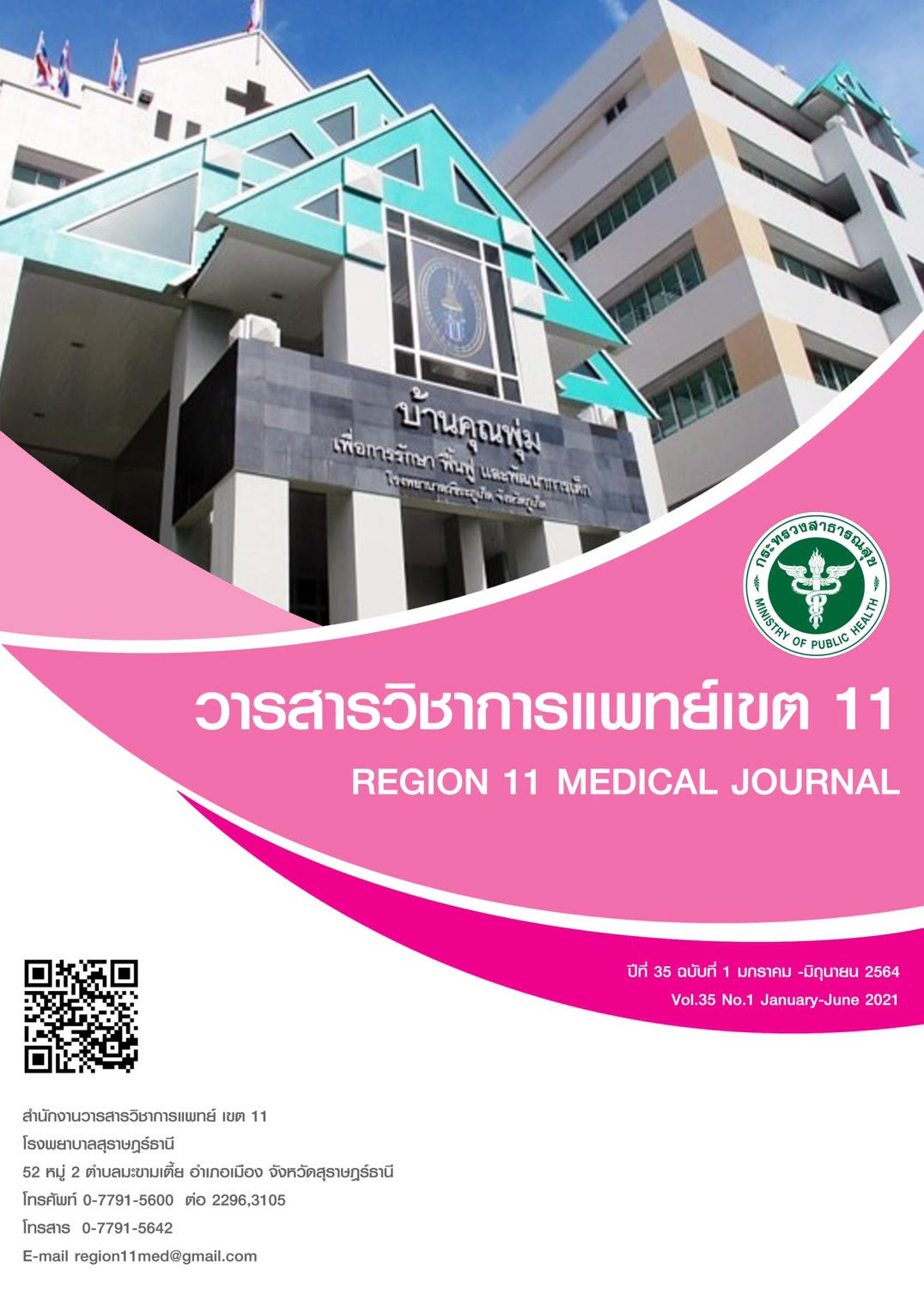Effectiveness of Implementing Happiness Program among Chronic Disease with Major Depressive Disorder, Koh Phangngan Hospital, Suratthani Province
Keywords:
happiness program, depressive disorder, chronic DiseaseAbstract
Background: A major problem of providing care for patients with depressive disorder is that the recent treatments have relied solely on medication and psychoeducation program, but there are few services using mental therapy. Indeed, in addition to the medication treatments, treatments using mental therapy program may be also required for patients with major depressive disorder.
Objective: To evaluate effectiveness of implementing happiness program among chronic disease with major depressive disorder, Koh Phangan Hospital, Suratthani.
Methods: This quasi experimental study, one-group pre-posttest. The samples comprised 35 patients diagnosed with diabetes type 2 and hypertension with depressive disorder, who were screened for depressive disorder level using 9-Item Thai Patient Health Questionnaire (Thai PHQ-9). The level of depression varied from mild to moderate (7-18 score). The samples group participated in the happiness program. The depressive disorder level and happiness level were collected by questionnaire before and after the subjects participated in the program. Data were analyzed using descriptive statistics and Paired-sample t-test.
Results: The findings revealed that before participating the happiness program, the subjects were found to have depressive disorder with mild level (73.4%) and with medium level (25.7%). After the program participation, most of subjects (91.4%) did not show depressive disorder and 8.6% of them had a mild level. The average depressive disorder score before and after the program participation with statistical significance (t=6.4, p<0.05). Meanwhile, the average happiness score before and after participating in the happiness program with statistical significance (t=12.5, p<0.05).
Conclusion: It is argued from the current study that the happiness program makes the patients with depressive disorder likely to increase their happiness and reduce their depression.
References
World Health Organization. Depression and Other Common Mental Disorders: Global Health Estimates; 2017.
บุษลักษณ์ สาฆะ. การบำบัดแบบปรับเปลี่ยนความคิดและพฤติกรรมในผู้ป่วยโรคซึมเศร้า [การค้นคว้าอิสระปริญญาพยาบาลศาสตรมหาบัณฑิต]. ขอนแก่น: มหาวิทยาลัยขอนแก่น; 2555.
ชุมพล สินแสนกาศ. ประสิทธิผลของการใช้โปรแกรมการปรับเปลี่ยนความคิดและพฤติกรรมผู้ที่เป็นโรคซึมเศร้า โรงพยาบาลแม่ทา จังหวัดลำพูน [การค้นคว้าอิสระปริญญาพยาบาลศาสตรมหาบัณฑิต]. เชียงใหม่: มหาวิทยาลัยเชียงใหม่; 2556.
กรมสุขภาพจิต. รายงานสถิติประจำปี. นนทบุรี: สำนักพัฒนาสุขภาพจิต กรมสุขภาพจิต; 2562.
นิตยา จรัสแสง, ศิริพร มงคลถาวรชัย, เพชรรัตน์ บุตะเขียว, สมลักษณ์ บุญจันทร์, พรนิภา หาญละคร, สุวรรณ อรุณพงศ์ไพศาล. ภาวะซึมเศร้าในผู้ป่วยโรคเรื้อรัง. วารสารสมาคมจิตแพทย์แห่งประเทศไทย. 2555;57(4):439-46.
พีรุณี สัพโพ. ความชุกของภาวะซึมเศร้าในผู้ป่วยเบาหวานชนิดที่ 2 ในคลินิกเบาหวาน โรงพยาบาลพังโคน. วารสารศรีนครินทร์เวชสารม. 2554;25(4):272-79.
สุรชัย คำภักดี. ความชุกของโรคซึมเศร้าในผู้ป่วยโรคเรื้อรัง. วารสารการแพทย์โรงพยาบาลศรีสะเกษ สุรินทร์ บุรีรัมย์. 2555;27(2):107-12.
โรงพยาบาลเกาะพะงัน. รายงานสรุปผลการดำเนินงานโรงพยาบาลเกาะพะงัน ปีงบประมาณ 2562. สุราษฎร์ธานี: โรงพยาบาลเกาะพะงัน; 2562.
กรมสุขภาพจิต. แนวทางการดูแลเฝ้าระวังโรคซึมเศร้าระดับจังหวัด. (ฉบับปรับปรุงครั้งที่ 4). อุบลราชธานี: โรงพยาบาลพระศรีมหาโพธิ์; 2560.
อภิชัย มงคล, ยงยุทธ วงศ์ภิรมย์ศานติ์, ทวี ตั้งเสรี, วัชนี หัตถพนม, ไพรวัลย์ ร่มซ้าย, วรวรรณ จุฑา. รายงานการวิจัยการพัฒนาและทดสอบดัชนีชี้วัดสุขภาพจิตคนไทย ฉบับใหม่. ขอนแก่น: โรงพิมพ์พระธรรมขันต์; 2547.
ประกาย จิโรจน์กุล. แนวคิด ทฤษฎีการสร้างเสริมสุขภาพและการนำไปใช้. กรุงเทพฯ: ธนาเพรส; 2556.
พรพรรณ สุดใจ, เพ็ญพักตร์ อุทิศ. ผลของโปรแกรมกลุ่มบำบัดทางจิตสังคมแบบบูรณาการต่อภาวะซึมเศร้าและการทำหน้าที่ของผู้ป่วยโรคซึมเศร้าในชุมชน [วิทยานิพนธ์ปริญญาพยาบาลมหาบัณฑิต]. กรุงเทพฯ: จุฬาลงกรณ์วิทยาลัย; 2552.
กรมสุขภาพจิต. คู่มือความสุข 5 มิติ สำหรับผู้สูงอายุ. พิมพ์ครั้งที่ 5. กรุงเทพฯ: ชุมชนสหกรณ์การเกษตรแห่งประเทศไทย; 2558
อรพรรณ ลือบุญธวัชชัย, พีรพนธ์ ลือบุญธวัชชัย. การบำบัดรักษาทางสังคมสำหรับโรคซึมเศร้า. กรุงเทพฯ: ธนาเพรส จำกัด; 2553.
Rabiei L, Mazaheri MA, Masoudi R, Hasheminia SAM. Fordyce happiness program and postpartum depression. Journal of research in medical sciences: the official journal of Isfahan University of Medical Sciences. 2014;19(3):251-6.
Bolier L, Haverman M, Westerhof GJ, Riper H, Smit F, Bohlmeijer E. Positive psychology interventions: a meta-analysis of randomized controlled studies. BMC public health. 2013;13(1):119.
Downloads
Published
How to Cite
Issue
Section
License
Copyright (c) 2021 Region11Medical Journal

This work is licensed under a Creative Commons Attribution-NonCommercial-NoDerivatives 4.0 International License.






